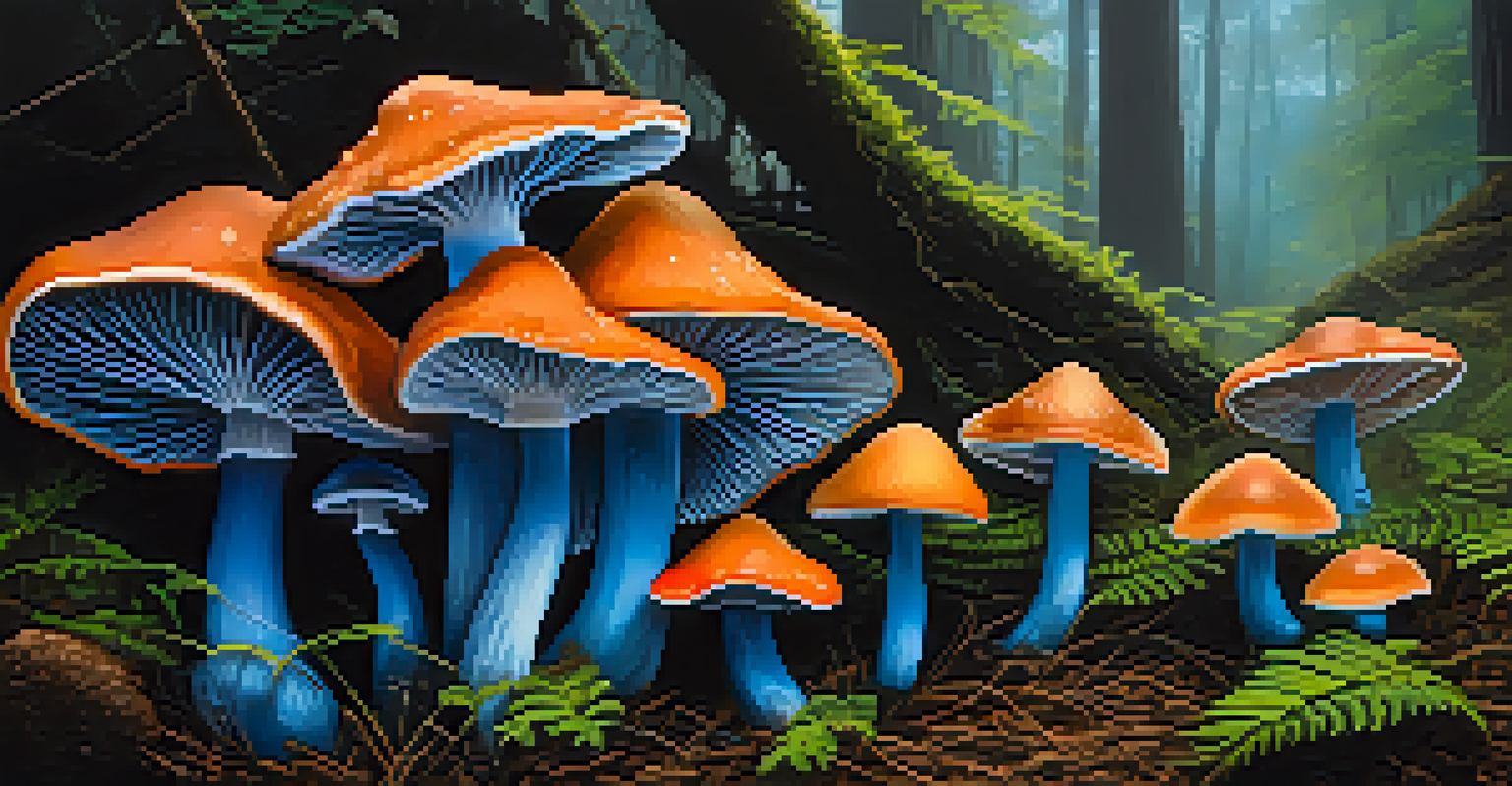Legalization Trends: Global Perspectives on Entheogens

Understanding Entheogens: A Brief Overview
Entheogens are substances that induce altered states of consciousness, often used for spiritual or therapeutic purposes. Common examples include psilocybin mushrooms, ayahuasca, and peyote. These substances have been utilized in various cultures for centuries, often integrated into religious practices and healing rituals. As society evolves, so does the perception of these substances, leading to burgeoning interest in their potential benefits.
Psychedelics can help us understand the nature of consciousness and the deep interconnectedness of all life.
The term 'entheogen' itself, derived from Greek, means 'generating the divine within.' This highlights the profound connection many users feel towards these substances, seeking not just recreation but deeper spiritual insights. With a growing body of research supporting their therapeutic potential, entheogens are increasingly being recognized as more than just illicit drugs.
Understanding the historical context of entheogens is essential for grasping current legalization trends. Many ancient cultures revered these substances, viewing them as sacred tools for enlightenment or healing. This rich background sets the stage for contemporary discussions about their legalization and potential integration into modern healthcare.
The Shift in Public Perception of Entheogens
Over recent years, public perception of entheogens has undergone a significant transformation. Once stigmatized and associated solely with counterculture movements, these substances are now being viewed through a more nuanced lens. Increased media coverage, coupled with influential figures advocating for their benefits, has played a pivotal role in changing attitudes.

Social media platforms have become a battleground for discussions on mental health, spirituality, and the potential benefits of entheogens. Personal stories and testimonials from individuals who have experienced profound changes through their use have sparked curiosity and interest. This grassroots movement is crucial in reshaping the narrative around these substances.
Entheogens' Historical Significance
Entheogens have been used for centuries in various cultures for spiritual and healing practices, shaping current perceptions and discussions about legalization.
As more people share their positive experiences, there's a growing recognition of entheogens as legitimate tools for healing and self-discovery. This shift in public perception is paving the way for legislative changes, as society becomes more receptive to exploring alternative therapies beyond conventional medicine.
Legalization Efforts: A Global Overview
Legalization efforts for entheogens vary widely across the globe, reflecting cultural differences and historical contexts. In some countries, like the Netherlands, psilocybin truffles are legal and readily available, while in others, such as the United States, the legal landscape is more fragmented. This patchwork of laws can be confusing and often leaves users uncertain about their rights.
The use of psychedelics in therapy is not just about the substance; it’s about creating a safe and supportive environment for profound change.
Countries like Canada and Brazil are also making strides towards more permissive policies regarding entheogens. For instance, in Canada, there's been a push to allow psilocybin for therapeutic use, especially among terminally ill patients. These developments indicate a shift towards recognizing the potential benefits of entheogens in addressing mental health crises.
Despite progress, challenges remain. Many regions continue to uphold strict prohibitions against these substances, often stemming from outdated perceptions and fears. Advocacy groups are working tirelessly to educate lawmakers and the public about the potential benefits of entheogenic substances, aiming for a more unified approach to legalization.
Case Study: The United States and Psilocybin
In the United States, psilocybin has emerged as one of the most discussed entheogens in the context of legalization. Several cities, including Denver and Oakland, have decriminalized the substance, allowing for personal use without legal repercussions. This grassroots approach often sparks larger discussions about broader reform across the nation.
Research institutions are increasingly exploring the therapeutic potential of psilocybin, particularly for mental health disorders such as depression and PTSD. Clinical trials have shown promising results, leading to calls for its medical use to be recognized formally. Advocacy for psilocybin therapy continues to gain momentum, with many calling for its rescheduling under federal law.
Changing Attitudes Towards Entheogens
Public perception of entheogens is shifting from stigma to acceptance, driven by personal testimonials and increased media coverage of their therapeutic benefits.
However, the journey towards full legalization is complex. The federal government's stance on psilocybin remains cautious, often lagging behind state and local initiatives. As public interest grows and research continues to unfold, the future of psilocybin in the U.S. remains a topic of lively debate.
The Role of Indigenous Knowledge in Entheogen Legalization
Indigenous communities have long used entheogens in their spiritual and healing practices, and their voices are increasingly being recognized in legalization discussions. This knowledge is invaluable, as it offers insights into the safe and respectful use of these substances. In many cases, Indigenous practices can serve as a model for responsible integration into modern contexts.
The recognition of Indigenous rights and practices is crucial in the conversation around entheogen legalization. Efforts to legalize substances like ayahuasca and peyote often involve navigating complex cultural and ethical considerations. There’s a growing awareness that any legalization must honor and protect the traditions of Indigenous peoples who have used these substances for generations.
Collaborative efforts between Indigenous groups and legalization advocates can lead to more holistic approaches to policy-making. By integrating traditional knowledge with modern research, societies can create frameworks that respect cultural heritage while exploring the potential benefits of entheogens.
Therapeutic Applications: Mental Health and Beyond
One of the most exciting aspects of the legalization trend is the therapeutic potential of entheogens for mental health treatment. Research suggests that substances like psilocybin and MDMA can significantly alleviate symptoms of depression, anxiety, and PTSD. These findings have prompted a re-evaluation of how we approach mental health care, moving away from solely pharmacological solutions.
Clinical trials are beginning to reveal the profound effects that entheogens can have on the brain, often leading to lasting changes in perspective and emotional resilience. For many, these substances provide a pathway to healing that traditional therapies may not offer. This paradigm shift in mental health treatment highlights the importance of integrating entheogens into medical frameworks.
Global Legalization Efforts Rising
Legalization efforts for entheogens are gaining momentum worldwide, with countries exploring their potential therapeutic applications and recognizing the importance of Indigenous knowledge.
However, therapeutic use must be approached with caution. Proper guidance, set, and setting are crucial for ensuring safe experiences. As the field of psychedelic therapy continues to evolve, establishing best practices and ethical guidelines will be essential to maximize benefits while minimizing risks.
The Future of Entheogen Legalization: What Lies Ahead
The future of entheogen legalization is bright, but it will require ongoing advocacy and education. As more studies emerge highlighting the benefits of these substances, public support is likely to grow. This could lead to further legislative changes and a more cohesive approach to entheogen policy worldwide.
International collaboration will play a key role in shaping future legalization trends. Countries can learn from one another’s experiences, both the successes and the challenges faced. This exchange of information and best practices can help streamline efforts and foster a more comprehensive understanding of entheogens.

Ultimately, the path to widespread acceptance and legalization of entheogens hinges on continued dialogue, research, and respect for traditional practices. As society grapples with mental health crises and seeks new solutions, the potential of entheogens to contribute positively to human well-being becomes increasingly relevant.